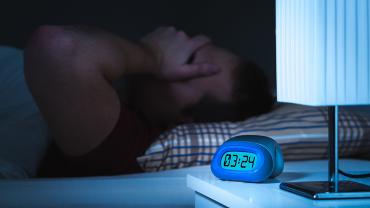
Researchers have long acknowledged that sleep — or the lack thereof — plays a huge role in Alzheimer’s disease (AD) pathology and other devastating age-related neurodegenerative conditions. Long-term disruptions in our circadian rhythm and sleep-wake cycle “often occur early in the course of the disease and may even precede the development of cognitive symptoms,” as evidenced by in vitro studies demonstrating that brain β-amyloid levels are regulated by the sleep−wake cycle. The fact that β-amyloid levels rise during wakefulness when neurons are active and fall during sleep has been known for years, as evidenced by the scientific literature. It is also known that amyloid and other metabolic wastes are cleared more effectively from the brain during sleep.
Previous studies have investigated long-term sleep deficits in older adults who have already shown signs and symptoms of mild cognitive impairments. However, more recent evidence shows that even short-term, acute sleep deprivation significantly impacts brain levels of Alzheimer’s biomarkers, even in young, healthy subjects.
According to a 2020 article published in the journal Neurology, the findings of a crossover study with a small sample size found that just one sleepless night significantly increased total tau (t-tau) plasma levels in the brain in healthy, young men. Tau proteins are found in neuronal cells that can form tangles and accumulate, even as much as a decade before the onset of AD symptoms. The study investigated 15 healthy, young men of normal weight who reported getting 7 to 9 hours of sleep regularly each night. In the first phase of the study, participants received two nights of good quality sleep. In the second phase, participants received one good night’s sleep followed by a sleepless night, in which participants were required to keep overhead lights on and stay awake either watching TV, playing games or talking. Researchers assessed morning and evening blood levels of five different AD biomarkers, including t-tau, β-amyloid 40 and 42, neurofilament light chain and glial fibrillary acidic protein.
The results of the trial showed a 17% average increase in t-tau in response to a sleepless night compared with an increase of <2% after a restful night. There were no significant changes in the other four AD biomarkers tested. Researchers concluded that this increase in t-tau levels provides “further evidence that sleep loss may have detrimental effects on brain health even in younger individuals.”
Larger longitudinal studies and randomized controlled trials are warranted to address other lifestyle and genetic factors and to determine how long the t-tau elevations last, but for now it is safe to say that this evidence provides insight into potential preventive interventions to reduce the risk of AD pathogenesis considering the importance of adequate sleep for memory, learning, cognitive abilities, and long-term brain health.
For these reasons, it’s critical that your patients take their sleep hygiene seriously, using various tools to ensure sufficient, quality sleep and to help reduce the risk of dementia developing later in life. There are numerous factors involved in sleep disturbances, many that result in elevated levels of stress and anxiety, which ultimately exhausts the central nervous system (CNS) and creates hormonal imbalance. Being in a constant “fight, flight or freeze” state seriously impacts the ability to fall and stay asleep. Harsh medications for sleep may help in the short-term, but these may also lead to detrimental downstream effects, as they act as a temporary remedy, but do not address the root cause.
There are several clinical considerations patients can implement before bedtime, such as turning off all media screens by at least an hour prior to sleep, wearing glasses that block blue light emissions, stopping food consumption 2 to 3 hours beforehand, creating a relaxing sleep environment, performing some simple stretches, journaling and/or meditating.
Melatonin, inositol, L-theanine, 5-hydroxytryptophan (5-HTP), gamma-aminobutyric acid (GABA), and other calming herbs also may be helpful in improving overall sleep. Melatonin mediates the body’s response to darkness and light, and controls the body’s circadian biological rhythms; excessive stress, caffeine, and alcohol, poor sleeping and eating habits, and insufficient daytime exposure to natural light can tremendously reduce the body’s natural production of melatonin. L-theanine is an amino acid that promotes calmness and reduces cognitive stressors, supporting overall sleep quality. GABA is the CNS’s primary inhibitory neurotransmitter that serves as a critical calming agent for the body. The botanicals valerian root, chamomile, passionflower and lemon balm are also known for their relaxing properties. Patients may be feeling especially vulnerable, stressed, and overwhelmed in light of the current global pandemic, making it particularly essential to support their sleep and cognitive and mental health.
By Caitlin Higgins, MS, CNS, LDN